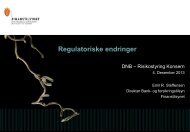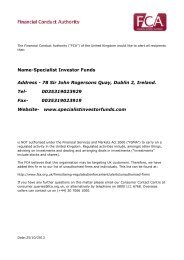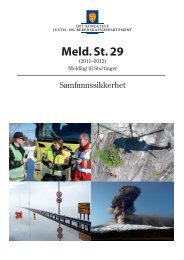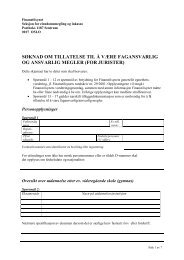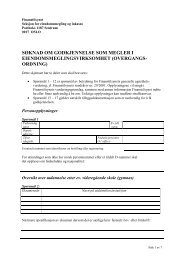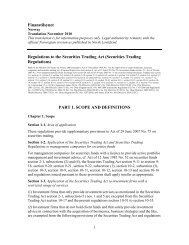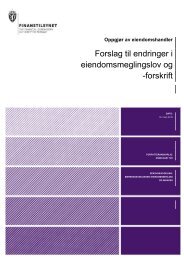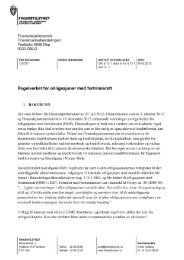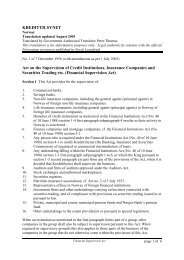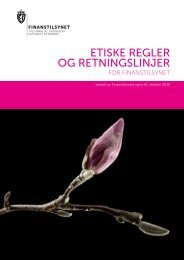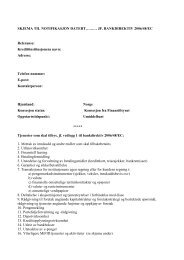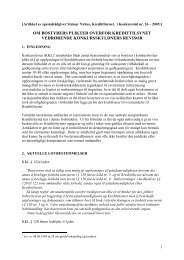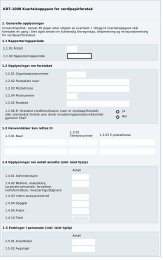Rapport om gjennomføring av AIFMD i norsk rett - Finanstilsynet
Rapport om gjennomføring av AIFMD i norsk rett - Finanstilsynet
Rapport om gjennomføring av AIFMD i norsk rett - Finanstilsynet
Create successful ePaper yourself
Turn your PDF publications into a flip-book with our unique Google optimized e-Paper software.
EN<br />
1.7.2011 Official Journal of the European Union L 174/5<br />
(28) The provisions on remuneration should be without<br />
prejudice to the full exercise of fundamental rights guaranteed<br />
by the Treaties, in particular Article 153(5) TFEU,<br />
general principles of national contract and labour law,<br />
applicable legislation regarding shareholders’ rights and<br />
involvement and the general responsibilities of the<br />
administrative and supervisory bodies of the institution<br />
concerned, as well as the right, where applicable, of social<br />
partners to conclude and enforce collective agreements,<br />
in accordance with national laws and traditions.<br />
(29) Reliable and objective asset valuation is crucial for the<br />
protection of investor interests. AIFMs employ different<br />
methodologies and systems for valuing assets, depending<br />
on the assets and markets in which they pred<strong>om</strong>inantly<br />
invest. It is appropriate to recognise those differences but,<br />
nevertheless, to require in all cases AIFMs to implement<br />
valuation procedures resulting in the proper valuation of<br />
assets of AIFs. The process for valuation of assets and<br />
calculation of the net asset value should be functionally<br />
independent fr<strong>om</strong> the portfolio management and the<br />
remuneration policy of the AIFM and other measures<br />
should ensure that conflicts of interest are prevented<br />
and that undue influence on the employees is prevented.<br />
Subject to certain conditions, AIFMs should be able to<br />
appoint an external valuer to perform the valuation<br />
function.<br />
(30) Subject to strict limitations and requirements, including<br />
the existence of objective reasons, an AIFM should be<br />
able to delegate the carrying out of s<strong>om</strong>e of its<br />
functions on its behalf in accordance with this<br />
Directive so as to increase the efficiency of the conduct<br />
of its business. Subject to the same conditions, sub-<br />
delegation should also be allowed. AIFMs should,<br />
however, remain responsible for the proper performance<br />
of the delegated functions and c<strong>om</strong>pliance with this<br />
Directive at all times.<br />
(31) The strict limitations and requirements set out on the<br />
delegation of tasks by AIFMs should apply to the<br />
delegation of management functions set out in Annex<br />
I. Delegation of supporting tasks, such as administrative<br />
or technical functions performed by the AIFM as a part<br />
of its management tasks, should not be subject to the<br />
specific limitations and requirements set out in this<br />
Directive.<br />
(32) Recent developments underline the crucial need to<br />
separate asset safe-keeping and management functions,<br />
and to segregate investor assets fr<strong>om</strong> those of the<br />
manager. Although AIFMs manage AIFs with different<br />
business models and arrangements for, inter alia, asset<br />
safe-keeping, it is essential that a depositary separate<br />
fr<strong>om</strong> the AIFM is appointed to exercise depositary<br />
functions with respect to AIFs.<br />
(33) The provisions of this Directive relating to the<br />
appointment and the tasks of a depositary should<br />
apply to all AIFs managed by an AIFM subject to this<br />
Directive and therefore to all AIF business models. They<br />
should, however, be adapted to the specificities of<br />
different business models. For s<strong>om</strong>e business models<br />
certain depositary tasks are more relevant than for<br />
others, depending on the type of assets the AIFs are<br />
investing in and the tasks related to those assets.<br />
(34) For AIFs that h<strong>av</strong>e no redemption rights exercisable<br />
during the period of 5 years fr<strong>om</strong> the date of the<br />
initial investments and that, in accordance with their<br />
core investment policy, generally do not invest in<br />
assets that must be held in custody in accordance with<br />
this Directive or generally invest in issuers or non-listed<br />
c<strong>om</strong>panies in order potentially to acquire control over<br />
such c<strong>om</strong>panies in accordance with this Directive, such<br />
as private equity, venture capital funds and real estate<br />
funds, Member States should be able to allow a notary,<br />
a lawyer, a registrar or another entity to be appointed to<br />
carry out depositary functions. In such cases the<br />
depositary functions should be part of professional or<br />
business activities in respect of which the appointed<br />
entity is subject to mandatory professional registration<br />
recognised by law or to legal or regulatory provisions<br />
or rules of professional conduct and can provide<br />
sufficient financial and professional guarantees to<br />
enable it to perform effectively the relevant depositary<br />
functions and meet the c<strong>om</strong>mitments inherent in those<br />
functions. This takes account of current practice for<br />
certain types of closed-ended funds. However, for all<br />
other AIFs, the depositary should be a credit institution,<br />
an investment firm or another entity permitted under<br />
Directive 2009/65/EC, given the importance of the<br />
custody function. For non-EU AIFs only, it should also<br />
be possible for the depositary to be a credit institution or<br />
any other entity of the same nature as the entities<br />
referred to in this recital as long as it is subject to<br />
effective prudential regulation and supervision which<br />
h<strong>av</strong>e the same effect as Union law and are effectively<br />
enforced.<br />
(35) The depositary should h<strong>av</strong>e its registered office or a<br />
branch in the same country as the AIF. It should be<br />
possible for a non-EU AIF to h<strong>av</strong>e a depositary established<br />
in the relevant third country only if certain additional<br />
conditions are met. On the basis of the criteria set<br />
out in delegated acts, the C<strong>om</strong>mission should be<br />
empowered to adopt implementing measures, stating<br />
that prudential regulation and supervision of a third<br />
country h<strong>av</strong>e the same effect as Union law and are<br />
effectively enforced. Further, the mediation procedure<br />
set out in Article 19 of Regulation (EU) No<br />
1095/2010 should apply in the event that c<strong>om</strong>petent<br />
authorities disagree on the correct application of the<br />
other additional conditions. Alternatively, for non-EU<br />
AIFs, the depositary should also be able to be established<br />
in the h<strong>om</strong>e Member State or in the Member State of<br />
reference of the AIFM managing the AIF.



